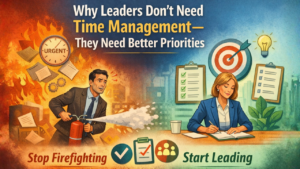SME Workplace Culture – The Key to Small Business Success
The easiest way to understand SME workplace culture is to imagine what happens when a new employee joins your store, café, or service business. If the people around them are attentive to customers, support each other, share information, and work hard, they’ll naturally do the same. But if the workplace is negative, disengaged, or inconsistent, that’s the behaviour they’ll adopt instead.
Culture is the invisible engine that drives attitudes and behaviours in your business—and by extension, your customer experience. You can put systems in place or have managers spend more time correcting issues, but building culture in SMEs isn’t about rules alone. If it’s not backed by a strong, positive culture, staff will find workarounds or simply ignore the direction.
Culture Challenges for SMEs
Small businesses face unique pressures. Competition isn’t just from the shop across the street or online retail—it’s also from the rise of the “experience economy.” Research from Eventbrite shows that millennials increasingly prioritise experiences over products, with 78% preferring to spend on events, activities, and cultural experiences rather than physical goods.
For SMEs, that means the employee engagement in SMEs directly impacts your ability to deliver a memorable customer experience. If your workplace culture is flat, the customer experience will be, too.
Culture for Small Business Success
To compete, retail and service SMEs need to deliver a fantastic, memorable experience. Browsing, trying, comparing, and buying can be deeply enjoyable for customers—but only if your team is motivated, connected, and delivering consistent service. That’s where SME leadership and culture come in.
Start by aligning your people with the purpose of your business. This is more than “we’re here to make sales.” Explore deeper reasons—lifestyle, simplicity, image, or social responsibility. Involving your team in this conversation ensures the purpose feels authentic and shared.
Small Business Culture Tips
Engage your team in defining your purpose – Ask them why the business exists and how it benefits customers and the community.
Define your culture in one word – Keep it simple so it’s memorable and repeatable.
Make it a daily conversation – Ask, “What attitudes and behaviours will help us live our purpose?”
Focus on employee experience – The way your people feel at work will directly shape the way customers feel in your business.
When employees are engaged, motivated, and connected to the company’s purpose, they create a positive SME workplace culture that inspires both colleagues and customers. Over time, this builds a strong reputation, increases loyalty, and creates a competitive edge that’s hard to match.
As Ross Judd, founder of Team Focus International and author of Cultural Insanity, puts it:
“A great customer experience starts with a great employee experience. Build the right culture, and success will follow.
Ross Judd, Founder, of Team Focus International and author of “Cultural Insanity”





